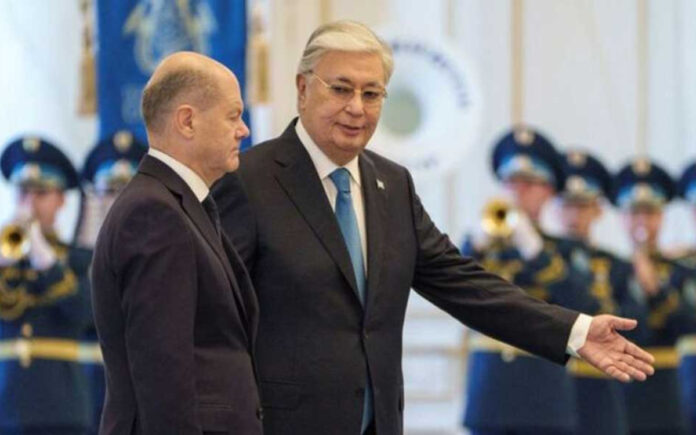Astana: Kazakh President Kassym-Jomart Tokayev has urged German Chancellor Olaf Scholz to support China’s peace plan for Ukraine, expressing doubt over the possibility of Russia being defeated on the battlefield. “It is a fact that Russia cannot be defeated in the military sense,” Tokayev told Scholz during the German leader’s visit to Astana. However, Scholz rejected this suggestion, reiterating Germany’s support for Ukraine’s sovereignty.
Chancellor Scholz’s visit to Central Asia marks his first official tour of the region, as Berlin seeks alternative sources of energy and minerals following Russia’s invasion of Ukraine. While Tokayev emphasized the potential global consequences of further military escalation, Scholz maintained Germany’s stance, stating, “Germany is supporting Ukraine because Russia had invaded it. That is the case and will remain so, so that the country can defend itself and protect its integrity and sovereignty.” He added that exploring peaceful solutions remains a priority.
Ukrainian officials have consistently called on their allies to permit the use of long-range Western-provided weapons to target Russian sites deeper inside Russian territory. Currently, the U.S. has restricted Ukraine’s use of American weapons to areas within a limited range inside Russia’s border with Ukraine.
Also Read | Russia Aims to Secure Victory in Ukraine War by 2026
Talks on allowing such long-range strikes were reportedly on the agenda during a meeting between U.S. President Joe Biden and British Prime Minister Keir Starmer in Washington. However, no immediate decision was announced. Ukrainian President Volodymyr Zelenskyy has been advocating for the ability to use Western weapons to strike more distant Russian air bases and launch sites, particularly as Russia intensifies attacks on Ukraine’s energy infrastructure ahead of winter.
Also Read | Meta Cracks Down: RT and Russian Media Banned for Covert Operations
Meanwhile, Moscow continues to warn that permitting long-range strikes would provoke further escalation between Russia and the West. These warnings align with the Kremlin’s narrative since the onset of the conflict, which accuses NATO countries of participating in the war and threatens retaliatory measures.



